Translated by Dominic Spadacene.
Another six months have passed, and, as promised, we are once again here to report in detail on Telex's development and financial situation.
Since Telex is primarily maintained by our supporters, we consider it important to provide them (and everyone) with regular and transparent accounts about how much money we have and what we spend it on. Anyone who is willing and able to support us can do so here with just a few clicks.
As we already mentioned in our first and second transparency reports, it's not considered common practice for a media company (or any company for that matter) to disclose in a manner more detailed than what is required by law how much money it has and how it is spent. However, since our story is by no means conventional and the fact that Telex runs mainly on the funds we've received from supporters, it seemed only obvious that we would disclose the details of our management and what sort of plans we have for the future.
After all, this isn't just our story but also the story of those who support us.
So far, we've released transparency reports last November as well as this past June. Let's take a look at what's happened since our last detailed write-up!
We won prestigious journalism awards
This past September the European Danube Academy and the Danube Region and Central European Institute presented Telex's editorial staff with the György Konrád Award. Telex received the award for its work done for democracy, press freedom, and human dignity. Telex's editors-in-chief Szabolcs Dull and Veronika Munk accepted the György Konrád Award along with its €5000 grant at the German Embassy in Budapest.
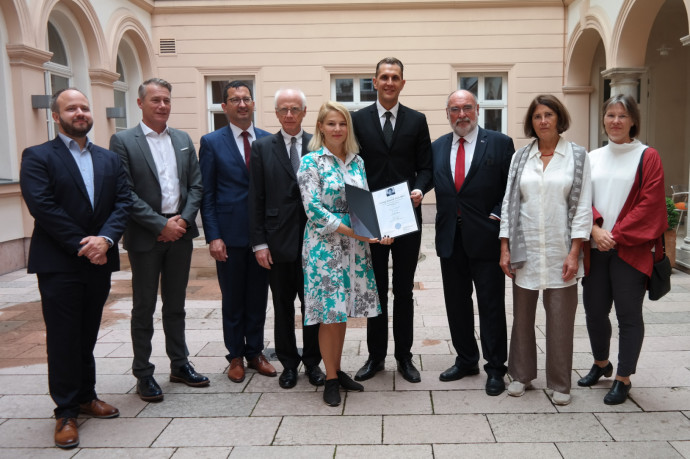
Our colleague, Dániel Bolcsó, received the Quality Journalism Award from the Hungarian Editors-in-Chief's Forum for his analyses of the Covid-19 pandemic, while another one of our colleagues, András Földes, shared in the Quality Journalism Award for his series of reports about Afghanistan. He later also won the Development Journalism Award for the same series.
Telex staff won the main prize at the Hégető Honorka Awards for their video documentary about how a vast amount of waste in Transcarpathia finds its way into the Tisza River and gets carried across the border.
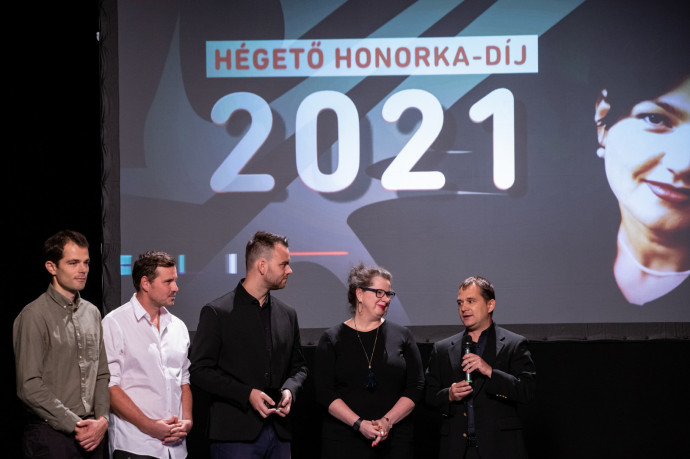
We had a record number of visitors this summer
Despite being barely a year old, Telex was quick to become a rather popular news site in Hungary with hundreds of thousands of readers every day. We had a record day this past August: 868,632 unique visitors to Telex in a single day – that's how many of them/you came to us to get informed. That day we were the second most read news site on the Internet in Hungary. (The total number of visits we received that day was over 3 million.)
What makes Telex worth reading?
Like we said last time: we take just as much pride in our articles and videos that delve into the background of events in more detail as we do in our swift news service.
In an extensive news stream going on for days, we reported on the twists, successes, and setbacks of the opposition's surprise-ending primary election: in addition to the series of minute-by-minute briefings, analyses, and campaign reports, we were pleased to be able to provide a live broadcast in which Tamás Fábián had the chance to ask questions to political scientist Gábor Török as well as the primary's political protagonists.
Our colleague András Földes, who is clearly attracted to dangerous places, went to Afghanistan as a one-man crew so that we could witness the aftermath of the withdrawal of American troops first-hand: his series of articles can be found here. We also plan on presenting his film about the situation in Afghanistan soon.
The Pegasus case has been one of the most influential topics in recent months and one that raised the most questions. As such, we gave it a very high priority. Articles regarding the latest targets were – and still are – covered by the Direct36 investigative team first on Telex. At the same time, we also greatly value the work of our journalists in uncovering, for example, who meets at the Prime Minister's headquarters, the Carmelite Monastery, and why.
In addition to the Telex Magyarázó video series, the Telextárcák series of short literary pieces, the Like Playoffs, and the daily Brainiac series, we've also tried to delve deeper into certain topics: in the Komplex column we deal at length with such topics as the MOL Tower rising over Budapest, the water disappearing from Lake Velence, the legend of extravagant wages in the restaurant industry at Lake Balaton, athlete abuse, as well as the relationship between hunting and politics.
We're proud of our domestic and international partnerships
We've had quite a few super content collaborations over the past six months as well, including with several foreign newspapers and groups of journalists. We consider it important for Telex to work with the best, both at home and on the international stage.
Here are the collaborations that have taken place since our last report:
- Immediately following the revelation of the Pegasus case, articles from the Direkt36 Investigative Center were inserted into Telex's pages. Even before then, Direkt36 had already uncovered several high-profile cases: from the businesses of Orbán's family and the huge state loan in connection with Budapest's Fudan University to the background of Hungarian-German relations.
- Our interviews and analyses relating to the EU are also published on the Visegrad Insight Central European Analysis Platform and the Euractiv news site.
- Telex is also the only Hungarian newspaper to publish the articles of the international fact-finding team Investigate Europe.
- We also partnered up with the Transylvanian-Hungarian and Slovakian-Hungarian newspapers Transindex and Új Szó on common, cross-border topics as part of the International Press Institute's NewsSpectrum Fellowship.
- Telex is the only Hungarian participant in Europe Talks, a massive event involving 17 different countries that aims to bring together tens of thousands of people from all over Europe to have cross-border debates about the most pressing and polarising issues of the day. What's more, the conversations take place between complete strangers who have very, very different opinions on the given issues.
- Deutsche Welle's German public service media videos are regularly released on Telex in Hungarian.
- The Bellingcat investigative team, which consists of independent international researchers and journalists, published a report on football ultras in Hungarian on Telex.
- In September 2021, we started publishing Holdblog's weekly economic analyses in the framework of a sponsored content collaboration between Telex and HOLD Asset Management.
- Szemlélek publishes a series of opinion articles on Telex regarding the connections between religion and everyday life. Hungarian Auto Community Alapjárat keeps our readers informed about car-related topics.
We launched an internship program: ten talented, young journalists started studying and working at Telex
The free press is in bad shape in Hungary. The number of editorial offices that properly regulate power has been in decline over the past ten years, and there are ever more newspapers, radio stations, and television channels whose owners are tied to politics or politicians. Telex is not one of them: our core values are fairness, curiosity, transparency, and being critical. We looked for interns who would be happy to learn from us and carry on our values. We received over 500 applications and at the end of the three-round selection process, we recruited ten talented, young individuals for paid internships.
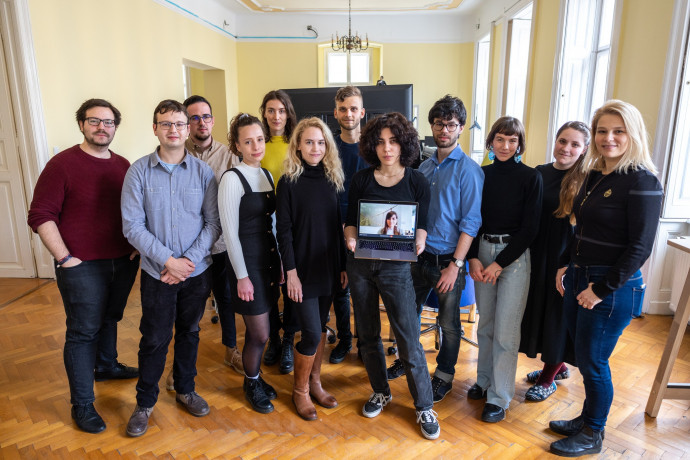
And since Telex considers it important to be able to provide its readers with stories from all over the country, we also train correspondents from outside of Budapest within the framework of the program. We provide them with housing in the capital during their training. As a result, in addition to Győr and Szeged, Telex will now also have local correspondents in Pécs and Debrecen.
The program kicked off this year and runs for nine months. An experienced Telex journalist has been assigned to every intern as a mentor and works closely with them to help ensure their development. Besides having a close, supportive mentorship, our interns also attend weekly practical training sessions run by Telex journalists.
The internship program was made possible by the contributions of many: Telex supporters, the Finnish Helsingin Sanomat Foundation, and both the US Embassy and the Embassy of the Kingdom of the Netherlands in Budapest. The program is managed by our non-profit organization, Ne Hallgassunk Nonprofit Kft, which is owned by editors-in-chief Veronika Munk and Szabolcs Dull and directed by Márton Kárpáti.
The Telex Shop was launched
This past October, we launched Telex Shop, an online store where you can buy all sorts of Telex-related products, including t-shirts, bags, masks, and notebooks, and in doing so, also support our operations. The store can be found here, and the sooner you make your purchases the better since we only plan to offer our collections as long as supplies last.
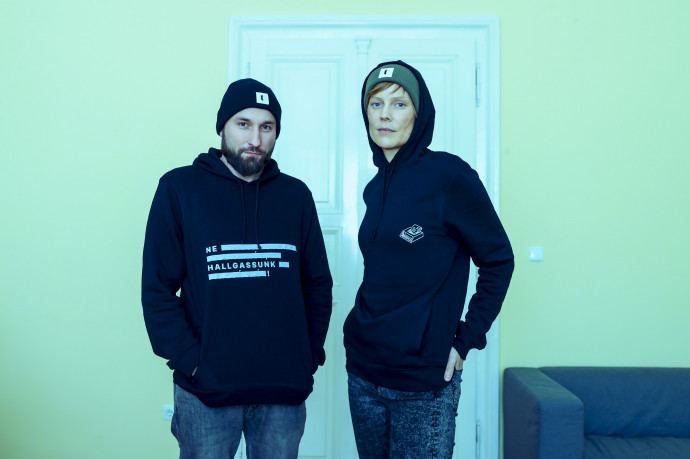
We prepared three collections for the store's launch. The "Ne hallgassunk!" collection was inspired by the phrase symbolizing Telex's beginnings [lit. "We mustn't stay silent!"]. The "t" and the telex machine collections, on the other hand, speak for themselves. By purchasing the products on our web store, you also support our work. As such, the products are priced accordingly.
Telex published its first book
October was a special month for yet another reason because shortly before our first birthday we published "The Fukushima Diver and Other Short Stories", a volume containing selections from our Telextárcák series as well as five previously-unpublished short stories.
"Childhood dreams, and reminiscence bitter and sweet. Terrified women. Community-service workers meeting over craft beers. A wooden bridge that we don't know whether it connects or separates." The anthology contains a total of twenty-eight short stories by twenty-three contemporary writers, including some of the best-known authors of Hungarian contemporary prose literature: György Dragomán, who became world-renowned for his novel "The White King", and Zsófia Bán, a recent recipient of a Swiss literary prize. The book is now available for order at the Telex Shop.
We have an editorial office
For more than a year after its launch, Telex had been operating out of an apartment office on Frankel Leó Way. Compared to the size of our editorial staff, the office was extremely small. It could accommodate roughly a fourth of our colleagues at once, which, due to the pandemic, we hardly ever even attempted. But we really wanted to be together, so following a long search, we found the ideal office space on Museum Boulevard.
We decided not to furnish our new editorial office in a traditional manner. Not only did we focus on making it possible for anyone to write articles there, but we also made sure for there to be rooms that could accommodate an entire column's worth of writers and corners where we could comfortably discuss what should go in the newspaper over a cup of coffee. Not to mention a big kitchen as well, since that's where a lot of action takes place. Beyond this, the office also came with double bathrooms and even a spiral staircase, which we're absolutely taken by – as it provides immediate access to the second floor.
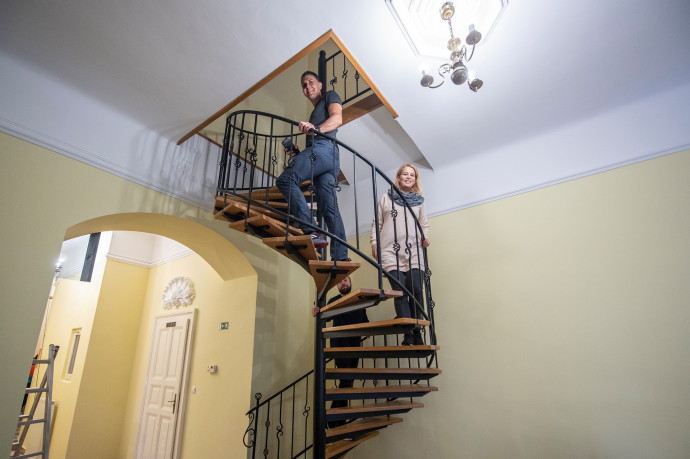
We saved on expenses where we could with the move: most of the furniture came used from other offices, and we brought in what we could ourselves. The lack of an elevator is getting us in better shape.
Our systems are developing alongside us
It is mainly through reader support that Telex can operate and improve. Another important goal of ours is to have adequate reserves in the event of a political attack. This is also why it's vital that
anyone who is able to do so, please support our work simply by clicking here.
We've made a lot of improvements in recent months. Some of them could be visibly appreciated by our readers, but the truly big work took place under the hood: technological improvements to Telex's back-end systems that maximize the speed, stability, and quality of our services for our readers.
We won't get into all the details, but the items on the list ranged from image optimization and minor application performance improvements to making our donation system more transparent.
Among our more eye-catching developments over the past six months was the enhanced minute-by-minute broadcasting for the European Football Championship and the Olympics as well as our other sports-broadcast related innovations (e.g. the scoreboard during football matches and the medal table for the Olympics, etc.). The two large sporting events and the fall primary elections kept us busy this summer not only with content but also with software development. We came out with a map for the primary election optimized for mobile (how most people read Telex). Here, too, there was a lot of behind-the-scenes work to carry out in order to ensure that we'll be able to provide the best possible reporting on the results during the 2022 elections.
Of course, we don't plan on backing off developments next year either. We are preparing for the elections with great vigor. In addition to our map, we'll also have an election supplement, and we're also improving the engine of our minute-by-minute broadcasts. Besides this, you can also expect a complete overhaul of our main page in the near future, and our app will receive a major update in the first half of next year, which will contain new useful features. Yes, that includes the search function that is so painfully missing.
Our plans for the future
We were conceived last fall, and in one year we managed to grow considerably, but we're not done yet. We'd like to provide the best possible, most interesting content every day, Monday to Sunday, dawn til dusk next year as well. We're looking forward to an eventful spring, as the election campaign is sure to heat up. We plan to recount, present, and expound on all of its important swings, and come election time, we will provide exhaustive reporting on its results and consequences. At the same time, we won't be exclusively focused on the election: we also hope to shed as much light next year on issues affecting our everyday lives in other spheres. It's our deep desire that provincial and international matters of interest also stand out as much as possible on our site.
In order to make Telex more efficient and broaden its content, we plan on reorganizing our management positions in January. We're establishing a directorate for business development, strategy, and marketing, which will be led by Managing Director Márton Kárpáti. Szabolcs Dull and Veronika Munk will continue to work closely together in a complementary manner, only in a different arrangement. From January 1st, Szabolcs Dull will be the Editor-in-Chief of Telex, and the Founding Editor-in-Chief Veronika Munk will be responsible for Telex's growth as Head of Content Development.
Currently, we have 71 employees, and we have service contracts with 21 others. Fortunately, our supporters have made it possible for us to expand and develop our newsroom and photo section.
FINANCIAL DATA OF VAN MÁSIK KFT. FROM LAUNCH UNTIL THE END OF OCTOBER 2021
| 2020.07 31. – 2021.10.31. | Thousands of HUF |
| Revenue (subscription fees, advertisements) | 329 746 |
| Donations, grants, journalism awards: | 1 159 297 |
| Interest and foreign exchange gains | 158 |
| Material expenses | 8 817 |
| Content (external contractors, news and picture agencies) + media services | 58 491 |
| Travel expenses | 3 124 |
| IT services | 23 334 |
| Communication services (Internet, phone) | 5 088 |
| Salaries, wages, and related expenses and contributions | 574 745 |
| Operating expenses (rent, utilities, printing, etc.) | 44 716 |
| Financial expenses (legal, accounting, payroll services, local business tax, contributions) | 13 817 |
| Other expenses (insurance, bank fees, credit card processing fees) | 27 279 |
| Depreciation (monthly accounting) | 14 509 |
| EARNINGS (excluding 2021 year-end taxes and adjustments) | 710 961 |
| Investments (CAPEX) | 40 666 |
And here's our non-profit's transparency report
Donations and grants are also being received by Ne Hallgassunk Nonprofit Kft., which was established by Veronika Munk, Szabolcs Dull, and Márton Kárpáti early this year in order to support the independence of Hungary's public sphere and help ensure the freedom of the press. As of October 31st, the company's revenues were EUR 236,730 and HUF 4,274,056 from donations and grants, which, of course, we are using to ensure that the ethics represented by Telex – correct, critical, and curious journalism – play an ever more prominent role in Hungary's public sphere. For example, it's with these funds that we are financing our internship program, which starts in December.
Of course, our non-profit also operates transparently, which is why we consider it important for everyone to see its revenues and expenses here.
2021.02.05. – 2021.10.31.
Revenues:
- The Czech publishing company Economia: EUR 200,000 (March 22)
- The US Embassy's "Small Grants" program: HUF 4,274,056 (October 1)
- Contribution from the Finnish Helsingin Sanomat Foundation: EUR 28,000 (October 7)
- Contribution from the Dutch State Human Rights Fund: EUR 5,940 (June 8)
- Other donations (mainly Swedish and Finnish individual donations): EUR 2,790
Expenses:
Bank charges and legal-, accounting-, and administrative fees: EUR 20.63 and HUF 381,459
Telex's first transparency report can be found here.
Telex's second transparency report can be found here.
You can support Telex here.